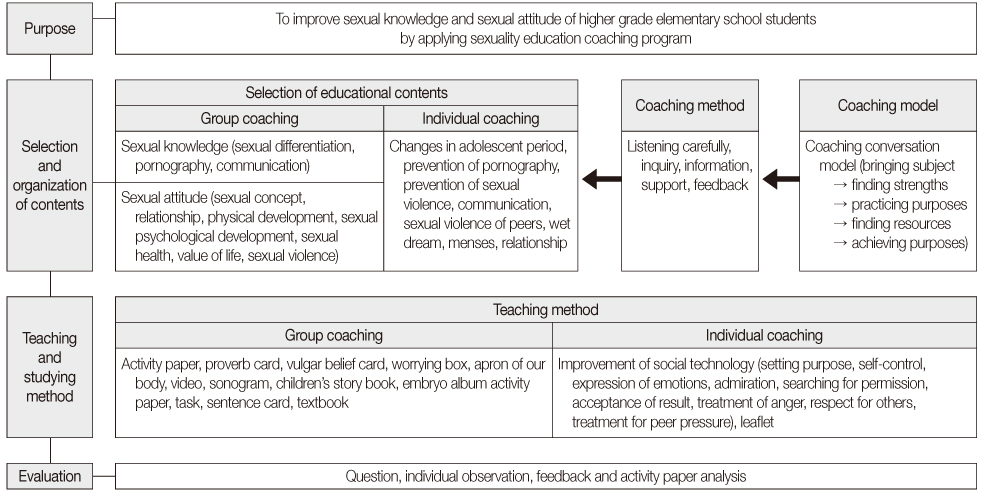J Korean Acad Nurs.
2014 Feb;44(1):31-40. 10.4040/jkan.2014.44.1.31.
Effects of Sexuality Education Coaching Program on Sex-related Knowledge and Attitude among Elementary School Students
- Affiliations
-
- 1Department of Nursing Education, Graduate School of Education, Keimyung University, Daegu, Korea.
- 2College of Nursing, Keimyung University, Daegu, Korea. kmp@kmu.ac.kr
- KMID: 1730904
- DOI: http://doi.org/10.4040/jkan.2014.44.1.31
Abstract
- PURPOSE
The purpose of this study was to investigate the effects of a sexuality education coaching program given to elementary school students in terms of sex-related knowledge and attitude.
METHODS
The participants were elementary school students in S city (Experimental group=21, Control group=23). Data were collected and the program was conducted from Feb. 15 to Apr. 15, 2013. The experimental group of 21 elementary school students in the fifth and sixth grades who received the sexuality education coaching program, 10 sessions in the three weeks. The control group of 23 elementary school students in the fifth and sixth grades from another school received, 2 sessions in the three weeks on sexuality education including physiology and sexual abuse prevention. Data were analyzed using chi2-test, independent t-test, repeated measures ANOVA, and utilized the SPSS program.
RESULTS
The experimental group showed significantly better sex-related knowledge and sex-related attitudes than the control group.
CONCLUSION
Therefore, individualized approach with emphasis on the differences of their level of understanding and strengths should be considered in providing sexuality education coaching programs for elementary school students.
MeSH Terms
Figure
Cited by 1 articles
-
Effects of Sexual Abuse Prevention Education Program on Sexual Knowledge and Attitude among Elementary School Students
Yun Hee Lee, Won Ju Hwang
J Korean Acad Community Health Nurs. 2016;27(2):132-143. doi: 10.12799/jkachn.2016.27.2.132.
Reference
-
1. Lee GJ, Do MH. The effectiveness of the child sexual violence prevention coaching programs for children into the children's sexual knowledge and the ability of coping with sexual matters and violences. Korean J Parent Edu. 2011; 8(1):45–67.2. The National Youth Policy Institute. 2012 Investigation of environmental risk factors for youth [Internet]. Seoul: The Ministry of Gender Equality & Family;2012. cited 2012 May 2. Available from: http://mogef.go.kr/korea/view/policyGuide/policyGuide07_07_01.jsp?func=view¤tPage=0&key_type=&key=&search_start_date=&search_end_date=&class_id=0&idx=691646.3. Kim SW. Theory and practice of sexual education / sexual consultation. 7th ed. Seoul: Educational Publishing;2011.4. Oh SM, Kim HL. Sex education, sex-related knowledge, sex-related attitude of 6th-grade elementary school students. J Korean Soc Sch Health. 2010; 23(2):228–236.5. Ministry of Education Science and Technology. 2013 Guidlines of sexual education and sexual harassment. Gyeongsangbukdo: Gyeongsangbukdo Seongju Office of Education;2013. p. 7.6. Bae JS, Kim YS, Kim HS. Effects of pictures on sexual education among primary school children. J Korean Soc Sch Health. 2010; 23(2):217–227.7. Kim JM, Lee MS, Song HJ. An analysis of risk factors for falls in the elderly by gender. J Korean Soc Health Educ Promot. 2008; 25(2):1–18.8. Lee S. The effects of sex education on the primary schooler's knowledge and attitude toward sex [master's thesis]. Busan: Pusan National University of Education;2002.9. Jung ES. The effects of problem-based learning through the internet on knowledge and attitude on sex of elementary school student [master's thesis]. Gongju: Gongju National University;2005.10. Kim YA, Yu HK, Cho YS. Development of a group counseling program to cultivate sexual perception of elementary school students in higher grade. Korean J Educ Methodol Stud. 2010; 22(4):67–90.11. Lee JH, Yu HK, Cho YS. The development of a parents-involved group counseling program to improve sexual-consciousness of elementary school students in higher grade. Korean J Youth Couns. 2011; 19(2):47–64.12. Han SS, Gook MG. The effect of sex education based on ICT (information and communication technology) to sex knowledge and attitude of 5th-year elementary students. J Korean Soc Health Educ Promot. 2003; 21(3):87–100.13. Haberleitne E. YH Lee . Coaching leadership. Paju: Kugil Securities & Economics Research Institute;2002.14. Hurlock EB. Adolescent development. 3rd ed. New York, NY: McGraw-Hill;1973.15. Coach U Inc. The coach U personal and corporate coach training handbook. Hoboken, NJ: John Wiley & Sons;2005.16. McNally K, Lukens R. Leadership development: An external-internal coaching partnership. J Nurs Adm. 2006; 36(3):155–161.17. Jung HO, Kim MY, Min SH. Learning coaching program to improve self-directed learning effectiveness. J Korean Pract Arts Educ. 2010; 16(4):197–212.18. Choi YR. The effect of childhood self-efficacy by NLPia Coaching Program using fairy tale of great men. Korean J Parent Edu. 2007; 4(2):5–34.19. Yang SO, Jeong GH, Kim SJ, Lee QY, Baek SS. Development and application of evaluation tool for sexuality education in elementary school. Korean J Child Health Nurs. 2002; 8(3):334–343.20. Woo OY, Kim YS, Park JS, Seo JR, Sheen MS, Yoo NS, et al. Health in elementary school life: Fifth grade. Seoul: YBM Si-sa;2011.21. Woo OY, Kim YS, Sheen MS, Jung EY, Kim MK, Park JS, et al. Health in elementary school life: Sixth grade. Seoul: YBM Si-sa;2011.22. Do MH, Jeong MH, Kim EJ. Personality coaching. Seoul: SJBook;2011. p. 87–92.23. Kirby D. Effective approaches to reducing adolescent unprotected sex, pregnancy, and childbearing. J Sex Res. 2002; 39(1):51–57. http://dx.doi.org/10.1080/00224490209552120.24. Lee KS, Lee CS. The effect of a sex education program on sex-related knowledge and attitude of 5th-grade elementary school students. J Korean Soc Sch Health. 2004; 17(1):25–39.25. Kim SB. Effect of school-based sex education: The improvement of sex related knowledges and attitudes of rural high school women students. Korean J Rural Med. 2001; 26(1):105–114.
- Full Text Links
- Actions
-
Cited
- CITED
-
- Close
- Share
- Similar articles
-
- The Effects of Sex Education on the Knowledge and Attitude toward Sex in Sixth Grade Elementary School Students
- Effects of a Cell Phone Use Education Program on Knowledge, Attitude, Self-efficacy, and Self-control of Cell Phone Use in Elementary School Students
- Effects of a Maternal Sexuality Education Program for Mothers of Preschoolers
- A Comparative Study of the Awareness of Sexual Violence between Male and Female College Student
- Compare the Knowledge, Attitude and Behavior about Smoking in the Elementary Students according to Anti-smoking Education


